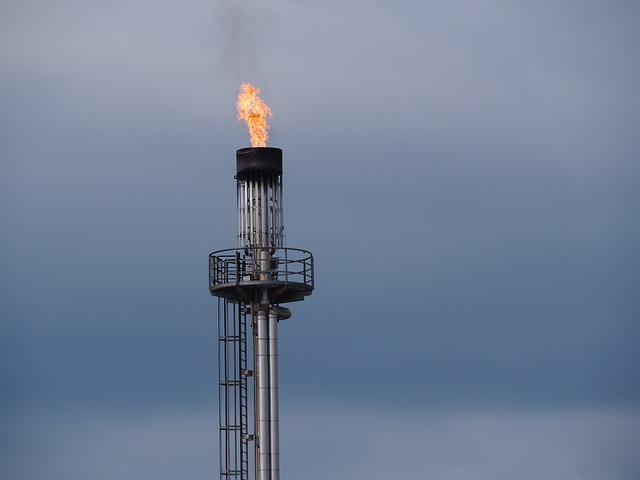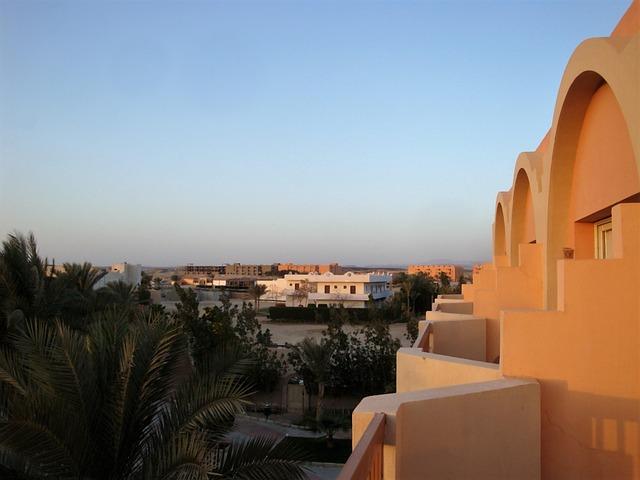Marsa maroc expands Into East Africa With djibouti Oil And Gas Port
In a significant move to enhance it’s strategic footprint in the burgeoning East African market, Marsa Maroc has announced its expansion into Djibouti with the establishment of a dedicated oil and gas port. This initiative not only underscores Morocco’s growing influence in regional trade and energy sectors but also positions Djibouti as a critical hub in the maritime logistics of hydrocarbons. With its prime location at the crossroads of key shipping routes and its proximity to major markets, the new port aims to streamline the flow of oil and gas resources, fostering economic growth and creating new opportunities for collaboration in the energy sector. As Marsa Maroc ventures into this pivotal territory, the repercussions of this growth are set to reverberate across the continent, particularly in the context of africa’s evolving energy landscape and its integration into the global market.
Marsa Maroc Launches Strategic Expansion into East Africa
Marsa Maroc has officially set its sights on East Africa with the inauguration of the Djibouti oil and gas port, marking a significant milestone in its strategic vision for expansion. This new venture not only strengthens the company’s footprint in the African market but also enhances regional trade capabilities. As part of this expansion, Marsa Maroc aims to leverage Djibouti’s strategic geographic position, which offers access to key maritime routes that are vital for international commerce.
The implications of this move are profound for both the local economy and the broader oil and gas sector. By establishing operations in Djibouti, Marsa Maroc seeks to tap into various opportunities, including:
- Increased trade volume: The port is expected to facilitate the transit of goods and energy resources between Africa and other continents.
- Job creation: This initiative will generate employment opportunities and boost local businesses.
- Technological transfer: Bringing in advanced technologies will enhance the efficiency and sustainability of operations.
Additionally, the company is poised to engage in partnerships with local stakeholders and international firms, fostering a collaborative environment that can drive significant growth in the region. The investment in Djibouti is not only a testament to Marsa Maroc’s commitment to diversifying its operational base but also positions it as a critical player in the burgeoning East African energy landscape.

Exploring the Economic Implications of the Djibouti Oil and Gas Port
The establishment of an oil and gas port in Djibouti represents a pivotal moment for economic development in the region. This new venture is expected to create a ripple effect, enhancing Djibouti’s position as a strategic logistics hub for energy resources in East Africa. The implications for local and regional economies are profound, as the port can facilitate increased trade, attract foreign direct investment, and provide job opportunities. Moreover, the growth of ancillary industries, such as logistics and supply chain management, can further stimulate economic activity, encouraging infrastructure improvements and fostering a robust business environment. Key stakeholders, including government agencies and international investors, are likely to benefit considerably from this project, given its potential to drive economic diversification beyond traditional sectors like agriculture and textiles.
A key aspect of the economic implications lies in the expected boost to regional cooperation. with the Djibouti port serving as a natural gateway for energy supplies, neighboring countries can look forward to enhanced access to vital resources. This could result in collaborative infrastructure projects, improved energy security, and a reduction in transportation costs.Possible benefits of this initiative include:
- Increased trade volumes due to improved logistics capabilities.
- Job creation across various sectors including construction, operations, and management.
- Foreign investment influx, driving innovation and modernization of services.
The following table summarizes the projected economic benefits associated with the Djibouti Oil and Gas Port:
| Economic Benefit | Expected Impact |
|---|---|
| Job Creation | 1,500+ new jobs |
| Increased Trade Value | $200 million annually |
| Foreign Investment | $300 million influx |

Enhancing Regional Connectivity through Key Infrastructure Investment
The strategic investment in the Djibouti Oil and Gas Port by Marsa Maroc signifies a transformative shift in regional connectivity and economic activity across East Africa. This development is not merely about enhancing trade routes; it represents a monumental step towards integrating East African economies. By improving access to vital resources and logistical hubs, the region can bolster its trade efficiency, attracting international investors and fostering local business growth. The port’s state-of-the-art facilities are set to accommodate the burgeoning demand for oil and gas exports, providing a seamless gateway for East African countries to the global market.
Several key advantages come with this infrastructure investment:
- Increased Trade Volume: The upgraded port facilities will enable higher shipping capacity,facilitating more robust trade exchanges.
- Job Creation: The expansion is likely to create numerous jobs within both the port and the surrounding community.
- Enhanced Supply Chain Efficiency: Improved logistics will reduce delays and costs associated with the transport of goods.
- Regional Stability: By boosting economic prospects, the investment contributes to broader regional stability and development.
To better understand the potential impact, consider the following table that outlines the projected economic benefits associated with the port’s enhancement:
| Benefit | Projected Impact |
|---|---|
| Increase in Cargo Volume | up by 40% by 2025 |
| Job Opportunities | Estimation of 10,000 new jobs |
| Trade Route Efficiency | Reduction in shipping time by 20% |
| Foreign Investment | Expected increase of 30% in FDI |

Potential Benefits for Local Economies and Employment Opportunities
The expansion of Marsa Maroc into East africa, particularly through the establishment of the Djibouti Oil and gas Port, is poised to deliver significant advantages to local economies. with increased maritime activities, this venture is expected to catalyze development by enhancing trade routes and attracting foreign investments.As an inevitable result, the following benefits can be anticipated:
- Job Creation: The new port will require a diverse workforce, creating numerous direct and indirect employment opportunities in construction, operations, and maintenance.
- Skill Development: Initiatives in training and education will be necessary to equip the local workforce with essential skills in logistics and port management.
- Boosting Local Businesses: Increased activity at the port can stimulate local entrepreneurs and businesses, from supply chain operations to hospitality services.
Furthermore, the economic ripple effects of this project could significantly uplift the region. For instance, supplementary sectors such as transportation, warehousing, and retail are likely to experience growth due to heightened demand. To illustrate this potential growth, consider the following table showcasing projected economic impacts:
| Sector | Projected Growth (%) |
|---|---|
| Logistics and transportation | 15% |
| Retail | 20% |
| Hospitality | 10% |
| Construction | 18% |
This expansion not only represents an opportunity for growth but also positions djibouti as a strategic player in the oil and gas sector, reinforcing stability and improving standards of living for the local population.

Navigating Challenges in the East African Oil and Gas Sector
The expansion of Marsa Maroc into the East African oil and gas sector marks a significant milestone, but this venture is not without its complexities. companies entering this burgeoning market must navigate a host of challenges, including:
- Regulatory Frameworks: Each East African country has its own set of regulations governing oil and gas operations, which can change rapidly.
- Infrastructure Development: Adequate infrastructure such as ports, roads, and pipelines is crucial to support exploration and production activities.
- Environmental concerns: Sustainable practices are increasingly becoming a focus, prompting companies to adopt environmentally-amiable methodologies.
- Geopolitical Stability: The region’s political landscape can be volatile, affecting investment decisions and operational security.
Furthermore, as Marsa Maroc positions itself in a pivotal location like Djibouti, accomplished navigation of the East African market will rely on several strategic approaches, such as:
| Strategy | Description |
|---|---|
| Local Partnerships | Collaborating with local firms to build trust and gain insights into the local market. |
| Technology Adoption | Leveraging advanced technologies to enhance exploration and improve operational efficiency. |
| Community Engagement | Engaging with local communities to foster goodwill and mitigate potential conflicts. |

Strategic Recommendations for Stakeholders in the Expansion Initiative
As Marsa Maroc embarks on its expansion into East Africa, it is crucial for stakeholders to align their strategies with the emerging dynamics of the Djibouti oil and gas port initiative. Investors should consider diversifying their portfolios to capture the anticipated growth in the region, focusing on sectors likely to benefit from enhanced logistics and trade capabilities. Local government agencies must establish frameworks that facilitate ease of doing business, ensuring that regulations adapt to the influx of foreign investments.Furthermore, engaging in public-private partnerships can lead to strengthened infrastructure development, creating a robust ecosystem for trade activities.
Additionally, logistics companies are encouraged to innovate and optimize supply chain management in alignment with the infrastructure upgrades. Emphasizing sustainable practices will not only enhance corporate image but also ensure compliance with global standards. It is equally vital for educational institutions to partner with industry players to develop relevant training programs, thereby creating a skilled workforce ready to meet the demands of this burgeoning sector. By fostering collaboration across various sectors, stakeholders can ensure that this expansion serves as a catalyst for regional economic growth.

To Conclude
Marsa Maroc’s strategic expansion into East Africa through its acquisition of the djibouti Oil and Gas Port marks a significant milestone in the company’s growth trajectory and highlights the increasing importance of the East African region in the global energy landscape. By enhancing its capabilities in one of the world’s key maritime corridors, Marsa Maroc not only strengthens its operational footprint but also positions itself as a pivotal player in facilitating trade and energy logistics in the region. This move reflects broader trends in the oil and gas sector, where access to vital infrastructure and strategic locations is becoming increasingly crucial. as Marsa Maroc embarks on this new venture, stakeholders will be keen to monitor the impact of this expansion on both the company’s performance and the economic development of Djibouti and its neighboring regions. with the global energy market evolving, the implications of this expansion could resonate far beyond the immediate geographical confines, influencing investment and trade patterns across the continent.







